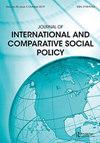The challenge of youth unemployment in Nigeria
Q2 Social Sciences
引用次数: 0
Abstract
Nigeria is home to a significant and growing “youth” population, over a third of it below 24 years of age. The demographic potential for productivity and growth this group represents occurs alongside large-scale unemployment among young people of working age. The “unemployment crisis” has deep historical roots and exists within a wider context of poor governance, insecurity, conflict, and poverty. Policy norms and practices to address youth unemployment in Nigeria largely centre on skill development and job creation, with complementary schemes selectively targeted to specific groups of vulnerable and poor individuals. Measures are typically ad hoc, detached from a coherent programme of sustainable reform. Pre-existing structural factors and capacity constraints also shape the effectiveness of these programmes. While a productivist focus within current policy is potentially empowering in giving young Nigerians “worker” status, it also detracts from attending to deep-rooted structural problems seen to affect young people in disproportionate ways. Securing meaningful choices and lives for Nigerian youth requires reframing youth unemployment beyond labour markets alone, and embedded in ideas of equality and collective action.尼日利亚青年失业的挑战
尼日利亚的 "青年 "人口众多,而且还在不断增长,其中超过三分之一的人年龄在 24 岁以下。这一群体所代表的生产力和增长的人口潜力与劳动适龄青年的大规模失业同时存在。失业危机 "有着深刻的历史根源,存在于治理不善、不安全、冲突和贫困的大背景下。尼日利亚解决青年失业问题的政策规范和做法主要集中在技能培养和创造就业机 会上,并有选择地针对特定的弱势和贫困群体实施补充计划。这些措施通常是临时性的,脱离了连贯的可持续改革计划。先前存在的结构性因素和能力限制也影响了这些计划的成效。虽然现行政策以生产为重点,有可能赋予尼日利亚青年 "工人 "的地位,但也有碍于解决被认为对青年产生过大影响的根深蒂固的结构性问题。要确保尼日利亚青年过上有意义的选择和生活,就必须重新审视青年失业问题,使其不仅仅局限于劳动力市场,还应将其纳入平等和集体行动的理念之中。
本文章由计算机程序翻译,如有差异,请以英文原文为准。
求助全文
约1分钟内获得全文
求助全文
来源期刊

Journal of International and Comparative Social Policy
Social Sciences-Sociology and Political Science
CiteScore
3.70
自引率
0.00%
发文量
18
 求助内容:
求助内容: 应助结果提醒方式:
应助结果提醒方式:


